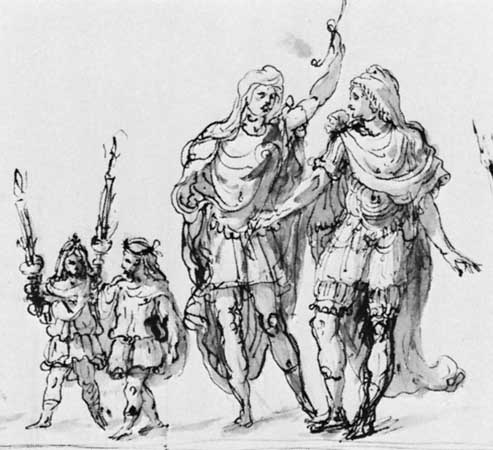masque
entertainment
also spelled mask
festival or entertainment in which disguised participants offer gifts to their host and then join together for a ceremonial dance. A typical masque consisted of a band of costumed and masked persons of the same sex who, accompanied by torchbearers, arrived at a social gathering to dance and converse with the guests. The masque could be simply a procession of such persons introduced by a presenter, or it could be an elaborately staged show in which a brief lyrical drama heralded the appearance of masquers, who, having descended from their pageant to perform figured dances, reveled with the guests until summoned back into their pageant by farewell speeches and song. The theme of the drama presented during a masque was usually mythological, allegorical, or symbolic and was designed to be complimentary to the noble or royal host of the social gathering.
Most likely originating in primitive religious rites and folk ceremonies known as disguising (mumming play), or mummery, masques evolved into elaborate court spectacles that, under various names, entertained royalty throughout Europe. In Renaissance Italy, under the patronage of Lorenzo de Medici, the intermezzo became known for its emphasis on song, dance, scenery, and stage machinery. No matter how literary, the intermezzi invariably included a dance or masked ball where the guests mingled with the actors. A nondramatic form, the trionfo, or triumph, evolved from these Italian court masques and, arriving in France, gave rise to the ballet de cour and the more spectacular masquerade.
During the 16th century the European continental masque traveled to Tudor England, where it became a court entertainment played before the king. Gorgeous costumes, spectacular scenery with elaborate machinery to move it on- and offstage, and rich allegorical verse marked the English masque. During the reign of Elizabeth I the masque provided a vehicle for compliments paid to the queen at her palace and during her summer tours through England. Under James I and Charles I masques were usually presented at court.
 Under the Stuarts the masque reached its zenith when Ben Jonson (Jonson, Ben) became court poet. He endowed the form with great literary as well as social force. In 1605 Jonson and the scene designer Inigo Jones (Jones, Inigo) produced the first of many excellent masques, which they continued to collaborate on until 1634. Jonson invented the antimasque—also known as the antemasque, the false masque, and the antic masque—and produced the first in 1609. It took place before the main masque, concentrated on grotesque elements, and provided a direct contrast to the elegance of the masque that followed. In later years the masque developed into opera, and the antimasque became primarily a farce or pantomime. After Jonson's retirement, masques lost their literary value and became mainly vehicles for spectacle.
Under the Stuarts the masque reached its zenith when Ben Jonson (Jonson, Ben) became court poet. He endowed the form with great literary as well as social force. In 1605 Jonson and the scene designer Inigo Jones (Jones, Inigo) produced the first of many excellent masques, which they continued to collaborate on until 1634. Jonson invented the antimasque—also known as the antemasque, the false masque, and the antic masque—and produced the first in 1609. It took place before the main masque, concentrated on grotesque elements, and provided a direct contrast to the elegance of the masque that followed. In later years the masque developed into opera, and the antimasque became primarily a farce or pantomime. After Jonson's retirement, masques lost their literary value and became mainly vehicles for spectacle.Masque entertainments in England ceased with the beginning of the English Civil Wars, and later revivals never equaled the originals.
Additional Reading
Stephen Ongel, The Jonsonian Masque (1965, reprinted 1981); David Lindley (ed.), Court Masques: Jacobean and Caroline Entertainments, 1605–1640 (1995); David Bevington and Peter Holbrook (eds.), The Politics of the Stuart Court Masque (1998); Lesley Mickel, Ben Jonson's Antimasques: A History of Growth and Decline (1999).
- Hicks Beach, Sir Michael Edward, 9th Baronet, 1st Earl St. Aldwyn Of Coln, Viscount Quenington Of Quenington, Viscount St. Aldwyn Of Coln
- Hicks, Edward
- Hicks, Elias
- Hicks, Granville
- Hicks, Sir John R.
- Hidaka Range
- Hidalgo
- hidalgo
- Hidalgo del Parral
- Hidalgo y Costilla, Miguel
- Hida Range
- Hidatsa
- hiddenite
- hide
- hide-and-seek
- Hideyo Noguchi
- Hielm, Jonas Anton
- Hien Vuong
- Hierakonpolis
- Hierapolis
- hieratic script
- Hierocles Of Alexandria
- hieroglyph
- hieroglyphic writing
- Hieron I